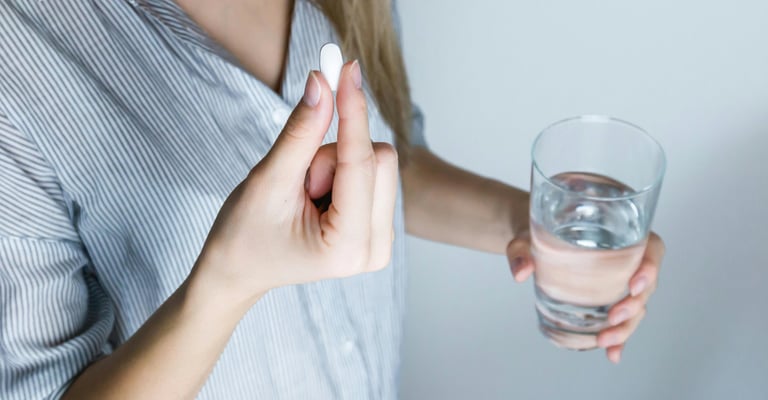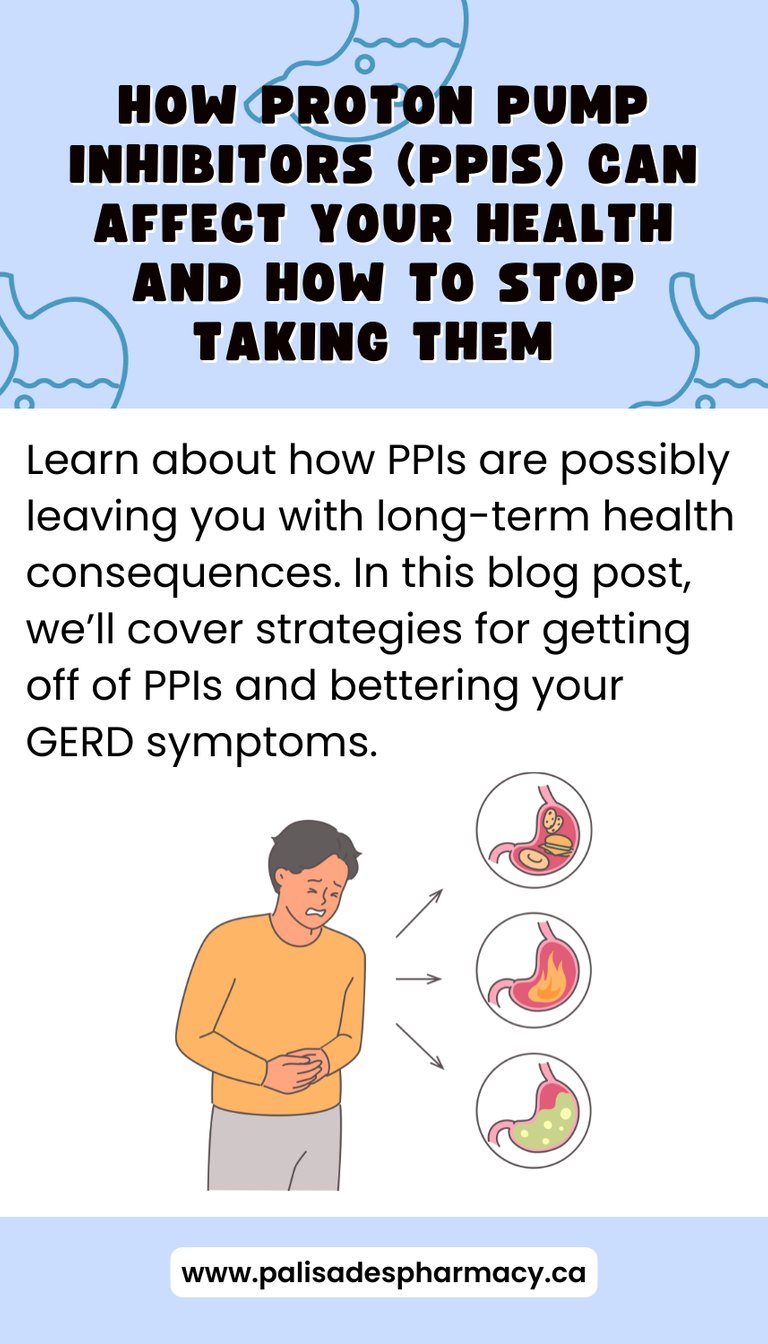How Proton Pump Inhibitors (PPIs) Can Affect Your Health and How to Stop Taking Them
Learn about how PPIs are possibly leaving you with long-term health consequences. In this blog post, we’ll cover strategies for getting off of PPIs and bettering your GERD symptoms.
GERDDIGESTION HEALTHPROTON PUMP INHIBITORS
Linda Nghiem | Pharmacist
12/10/20244 min read
Do you suffer from heart burn? Many people do. Gastroesophageal reflux disease, known as GERD, affects up to 20% of the global population. GERD can cause troublesome symptoms, including heart burn and acid regurgitation. People reach for over-the-counter medications, such as Tums or Gaviscon, but prescription medications are becoming increasingly common. They have minimal side effects and are effective for alleviating the pain associated with heart burn. However, they have a long-term consequence that often are overlooked.
What are Proton Pump Inhibitors (PPIs)?
Proton pump inhibitors (PPIs) are one of the most commonly prescribed medications. They work by shutting down the pump that produces stomach acid. Examples of PPIs include:
Dexlansoprazole (Dexilant)
Lansoprazole (Prevacid)
Rabeprazole (Pariet)
Pantoprazole (Pantoloc, Tecta)
Esomeprazole (Nexium)
Omeprazole (Losec)
Lifestyle modifications are effective for treating many cases of GERD.
The most logical approach is to not add more acidic foods into your stomach. Seems simple enough, but we eat many acidic foods and drinks: caffeinated drinks (ex. coffee, tea, pop), carbonated drinks (sparkling water), citric foods (ex. oranges, lemons, limes), cheese, fruits, tomatoes, onions, garlic, sauces, mint, chocolate.
If your food stays in your stomach for longer than desired, there will be a higher chance of acid regurgitating into your esophagus. Avoid foods that slow down your GI system, such as fatty foods or alcohol. Tight clothes that put pressure on your abdomen will cause problems too, so wear looser fitting clothes. Achieve and maintain a healthy weight. Excess pounds put pressure on your abdomen, pushing up your stomach and causing acid to reflux into your esophagus.
Gravity will help keep the acid in the stomach. Wait at least three hours after eating before lying down or going to bed. Avoid snacking before bedtime. If this doesn't work, then elevate the head of your bed. If you regularly experience heartburn while trying to sleep, place wood or cement blocks under the feet of your bed so that the head end is raised by 6 to 9 inches. If you can't elevate your bed, you can insert a wedge between your mattress and box spring to elevate your body from the waist up. Raising your head with additional pillows isn't effective.
Other ways you can reduce GERD symptoms include:
Stress reduction: Reducing stress can be helpful to relieve symptoms of GERD because stress causes more acid production in the stomach. Try doing yoga, meditation, or deep breathing to lower your stress.
Stop smoking: Smoking decreases the lower esophageal sphincter's ability to function properly.
Don't exercise after eating: Avoid vigorous exercise after eating. An evening stroll is fine, but more strenuous exercise can increase abdominal pressure and cause acid to overflow into the esophagus.
Check your medications with your pharmacist: Some medications can cause more acid to be produced or relax the esophageal sphincter, irritating the esophagus.
How can I avoid the hypersecretion of acid when stopping my medication?
For those who have been taking a PPI for a long time now, you may have tried to stop it before and the heartburn comes back with a vengeance, leading you to restart it and vow never to stop it again. The problem is that if you stop it abruptly, you will get a hypersecretion of acid. It lasts for up to 2 weeks after stopping the medication.
Strategies to reduce the needless suffering of hypersecretion of acid include:
Consider waiting longer between doses. If you are taking it twice a day, then lower to once a day first. Then every 36 to 48 hours. Keep at a dose for 2-3 weeks before lowering it more.
Take a different acid suppressing medication that does not suppress acid as strongly, such as ranitidine (Zantac) or famotidine (Pepcid). These are available over the counter. Antacids (Gaviscon, Tums, Rolaids) can be helpful too. They counteract the acid by either adding a basic substance or create a barrier of the acid from the esophageal tissue.
References:
Pharmacists Letter “Proton Pump Inhibitors: Appropriate Use and Safety Concerns”
Epidemiology, Causes, and Management of Gastro-esophageal Reflux Disease: A Systematic Review


They are effective for treating GERD with little short-term side effects (which may include headaches, dizziness, skin rash, abdominal pain, diarrhea, back pain). Long-term side effects are related to acid suppression for extended periods of time. Stomach acid's function is to break down your food, aid in the absorption of certain nutrients, and to kill germs that can potentially cause infection. We will see less absorption of calcium and magnesium, leading to impaired bone density and muscle function. There is less iron absorption, leading to anemia and fatigue. Vitamin B12 deficiency is possible, leading to impaired metabolism, anemia, and fatigue. Risk of infection increases as well, including C. difficile infections, community-acquired pneumonia, and upper respiratory infections.
If you take the PPIs seldom on an as-needed basis, then there are less concerns of the long-term side effects.
Are you considering trying to stop PPI's now? If you are, then make sure the original reason for the acid reflux is solved first.




Monday - Thursday: 9:00 AM to 5:30 PM
Friday: 9:00 AM to 5:00 PM
Saturday: 10:00 AM to 2:00 PM
© 2025. All rights reserved.
